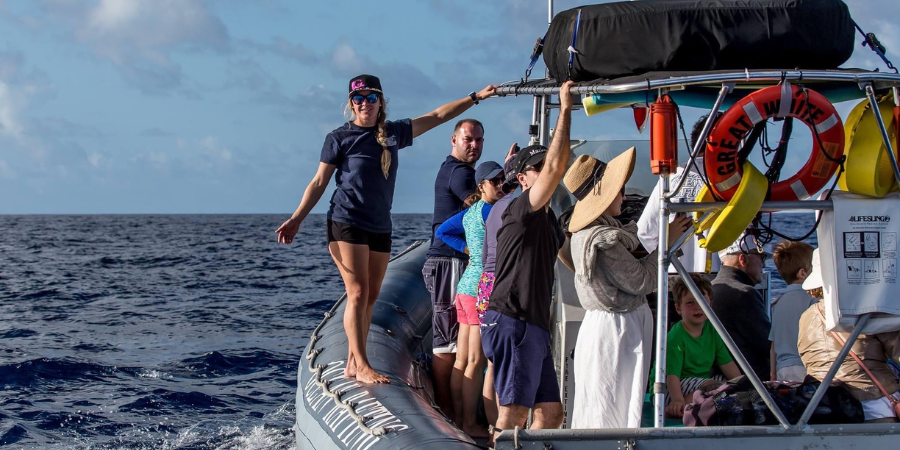
Rhianna working as a marine naturalist on Maui.
In November, Rhianna Thurber joined North Coast Land Conservancy’s team as the new Marine Program Coordinator.
Originally from Mesa, Arizona, Rhianna moved to Juneau, Alaska, in her early 20s. There she completed a bachelor of science degree in marine biology at the University of Alaska Southeast.
“Growing up, we used to go to Mexico each year, and I remember always being fascinated and curious with everything I found in the ocean and tide pools,” she says.
While completing her undergraduate degree in Juneau, Rhianna started working in ecotourism as a marine naturalist on whale-watching boats. After graduating, she moved to Maui, Hawaii, where she continued her work in ecotourism as a marine naturalist and photographer.
“My long-standing work experience in the tourism industry fostered my passion for expanding awareness as a means to create ocean stewards among the community and promote coastal resilience,” she says.
While Rhianna has long held an affinity for nature and marine mammals, it was during her time in Juneau that she developed an interest in whales—particularly North Pacific humpback whales (Megaptera novaeangliae), who feed in Alaska during the summer and migrate to Hawaii to reproduce in the winter months.
“When I first moved to Alaska and I saw a humpback whale for the first time, it was kind of love at first sight,” she says. It was this passion that took her to Hawaii, where she could observe and learn more about the other half of their lifecycle. “What has been really fascinating is being able to see the same individuals in Southeast Alaska and Hawaii.”
She described the species as a “huge conservation success story,” as they were almost commercially hunted to extinction by the mid-1900s. After roughly 50 years of protective legislation, their populations have made a substantial recovery.
A Passion for the Ocean
In the summer of 2020, Rhianna returned to Alaska to begin her graduate research with the Alaska Whale Foundation, a nonprofit conservation organization. Soon after, she moved to Corvallis to attend graduate school at Oregon State University, where she earned a master of science degree in marine resource management in June 2022.
Her thesis work focused on formulating population and density estimates of North Pacific humpback whales using distance sampling throughout specific areas of Southeast Alaska, in relation to the 2014-2016 North Pacific marine heatwave. She also focused on comparisons of current state and federal policy pertaining to humpback whale management between their summer feeding and winter breeding grounds.
She continues to expand her knowledge and understanding of Oregon coastal issues through professional and volunteer experiences. She recently served a fixed-term appointment as an Ocean Acidification and Hypoxia Assistant for the Oregon Department of Fish and Wildlife Marine Resources Program. She also volunteered for the Cape Perpetua Marine Reserve near Yachats and served on the steering committee for this year’s Land Sea Symposium.
In her capacity as NCLC’s marine program coordinator, with a focus on Cape Falcon Marine Reserve, she’ll have the chance to apply her knowledge of the Oregon Coast and the marine environment, as well as her passion for community science, advocacy and education.
“I’ve always been passionate about the ocean, but working in ocean conservation has been an ongoing journey,” she says. “The more diversified my work experience has become—and paired with graduate school—you understand the connectivity of everything in the ocean. You develop a deep passion for wanting to conserve the marine environment as a whole, and to spread awareness about the things that you love. … It can sometimes be challenging to get people to care about things that they don’t understand. By allowing people to get up close and personal with the ocean and species within, by allowing them to engage in community science, these experiences can serve as a useful tool to help propel change in the future.”
Comments